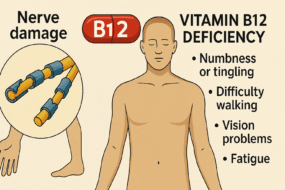Vitamin D remains one of the most vital nutrients for human health, supporting immunity, bone strength, hormone regulation, and inflammation control. However, experts warn that the line between sufficiency and toxicity is extremely thin. In a detailed explanation, health educator Dr. Eric Berg cautioned that overdosing on Vitamin D without medical supervision can severely damage the kidneys and other internal organs.
Dr. Berg referenced the work of Brazilian neurologist Dr. Cicero Coimbra, who developed the Coimbra Protocol—a high-dose Vitamin D therapy used for autoimmune disorders. Under this protocol, some patients take up to 200,000 IU of Vitamin D per day, but only under strict monitoring.
When Vitamin D Turns Dangerous
Excessive Vitamin D can cause hypercalcemia, a condition where calcium levels in the blood rise dangerously high. This can lead to:
- Kidney stones
- Kidney damage
- Calcification of arteries
- Deposits of calcium in soft tissues
Dr. Berg explained that large doses must be accompanied by nutrients such as magnesium, zinc, and Vitamin K2, which help regulate calcium absorption and prevent toxicity.
Risks of Vitamin D Deficiency
On the other hand, too little Vitamin D weakens immunity and increases the risk of autoimmune diseases like:
- Multiple sclerosis (MS)
- Lupus
- Graves’ disease
- Hashimoto’s thyroiditis
- Type 1 diabetes
- Vitiligo
Modern lifestyles—limited sunlight, indoor living, and nutrient-poor diets—have caused widespread Vitamin D resistance, where the body struggles to use the nutrient effectively.
How Much Vitamin D Is Safe?
Dr. Berg suggests that most adults may need 8,000–10,000 IU daily, though actual needs vary depending on genetics, health conditions, and absorption issues. Regular medical supervision is essential.
Preventing Vitamin D Toxicity
To safely maintain Vitamin D levels, experts recommend:
- Taking magnesium, zinc, and Vitamin K2 along with Vitamin D
- Avoiding excess calcium intake
- Regular blood monitoring
- Balancing supplementation with a nutrient-rich diet
Conclusion
Vitamin D is powerful—but must be used wisely. While deficiency weakens the immune system, excessive intake can cause irreversible harm. Experts emphasize maintaining balance, ensuring proper nutrient support, and consulting medical professionals for long-term supplementation.






One reply on “Doctor Warns of Vitamin D Overdose Risks: Excess Intake May Damage Kidneys and Vital Organs”
[…] Originally published on 24×7-news.com. […]